Studying the Big Bang with artificial intelligence
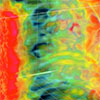 Can machine learning be used to uncover the secrets of the quark-gluon plasma? Yes - but only with sophisticated new methods.
Can machine learning be used to uncover the secrets of the quark-gluon plasma? Yes - but only with sophisticated new methods.
Jan 25th, 2022
Read more
 Subscribe to our Space Exploration News feed
Subscribe to our Space Exploration News feed
 Can machine learning be used to uncover the secrets of the quark-gluon plasma? Yes - but only with sophisticated new methods.
Can machine learning be used to uncover the secrets of the quark-gluon plasma? Yes - but only with sophisticated new methods.
Jan 25th, 2022
Read more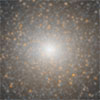 The discovery, one of the only confirmed intermediate-mass black holes, lives in an equally rare object known as a low-mass, stripped nucleus.
The discovery, one of the only confirmed intermediate-mass black holes, lives in an equally rare object known as a low-mass, stripped nucleus.
Jan 24th, 2022
Read more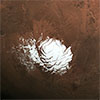 Liquid water previously detected under Mars' ice-covered south pole is probably just a dusty mirage, according to a new study of the red planet.
Liquid water previously detected under Mars' ice-covered south pole is probably just a dusty mirage, according to a new study of the red planet.
Jan 24th, 2022
Read more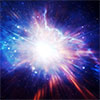 The findings could redefine the kinds of particles that were abundant in the early universe.
The findings could redefine the kinds of particles that were abundant in the early universe.
Jan 24th, 2022
Read more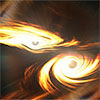 For the first time, scientists believe they have detected a merger of two black holes with eccentric orbits. This can help explain how some of the black hole mergers detected are much heavier than previously thought possible.
For the first time, scientists believe they have detected a merger of two black holes with eccentric orbits. This can help explain how some of the black hole mergers detected are much heavier than previously thought possible.
Jan 21st, 2022
Read more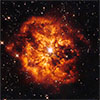 A first-of-its-kind exploding star - thought to have existed only in theory - was recently discovered.
A first-of-its-kind exploding star - thought to have existed only in theory - was recently discovered.
Jan 20th, 2022
Read more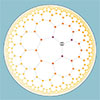 One of the mind-bending ideas that physicists and mathematicians have come up with is that space itself - not just objects in space - can be curved. When space curves (as happens dramatically near a black hole), sizes and directions defy normal intuition. Understanding curved spaces is important to expanding our knowledge of the universe, but it is fiendishly difficult to study curved spaces in a lab setting.
One of the mind-bending ideas that physicists and mathematicians have come up with is that space itself - not just objects in space - can be curved. When space curves (as happens dramatically near a black hole), sizes and directions defy normal intuition. Understanding curved spaces is important to expanding our knowledge of the universe, but it is fiendishly difficult to study curved spaces in a lab setting.
Jan 20th, 2022
Read more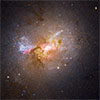 A black hole at the heart of the dwarf galaxy Henize 2-10 is creating stars rather than gobbling them up. The black hole is apparently contributing to the firestorm of new star formation taking place in the galaxy.
A black hole at the heart of the dwarf galaxy Henize 2-10 is creating stars rather than gobbling them up. The black hole is apparently contributing to the firestorm of new star formation taking place in the galaxy.
Jan 19th, 2022
Read more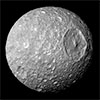 Scientist set out to prove that the tiny, innermost moon of Saturn was a frozen inert satellite and instead discovered compelling evidence that Mimas has a liquid internal ocean.
Scientist set out to prove that the tiny, innermost moon of Saturn was a frozen inert satellite and instead discovered compelling evidence that Mimas has a liquid internal ocean.
Jan 19th, 2022
Read more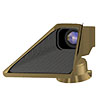 The lunar-based camera L-CAM1 will capture images for research in astrophysics, planetary science and planetary defense.
The lunar-based camera L-CAM1 will capture images for research in astrophysics, planetary science and planetary defense.
Jan 18th, 2022
Read more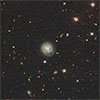 COW and GEP are new types of exploding stars. Researchers have succeeded in explaining the features of a new type of supernova which appears ten to a hundred times brighter at its peak, and with a much faster rise toward the peak compared to an ordinary supernova.
COW and GEP are new types of exploding stars. Researchers have succeeded in explaining the features of a new type of supernova which appears ten to a hundred times brighter at its peak, and with a much faster rise toward the peak compared to an ordinary supernova.
Jan 18th, 2022
Read more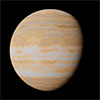 Gas giant planets, such as Jupiter, can form rapidly by incorporating nearby icy bodies made from drifting pebbles born in the outer parts of young planetary systems - all in a period of about 200,000 years. This finding has implications for understanding how habitable planets are created; not just in our solar system, but in others too.
Gas giant planets, such as Jupiter, can form rapidly by incorporating nearby icy bodies made from drifting pebbles born in the outer parts of young planetary systems - all in a period of about 200,000 years. This finding has implications for understanding how habitable planets are created; not just in our solar system, but in others too.
Jan 17th, 2022
Read more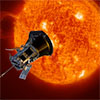 Understanding the solar wind can help scientists predict how it will affect Earth's satellites and astronauts in space.
Understanding the solar wind can help scientists predict how it will affect Earth's satellites and astronauts in space.
Jan 15th, 2022
Read more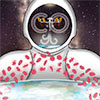 A world-first study has revealed how space travel can cause lower red blood cell counts, known as space anemia. Analysis of 14 astronauts showed their bodies destroyed 54 percent more red blood cells in space than they normally would on Earth.
A world-first study has revealed how space travel can cause lower red blood cell counts, known as space anemia. Analysis of 14 astronauts showed their bodies destroyed 54 percent more red blood cells in space than they normally would on Earth.
Jan 14th, 2022
Read more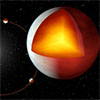 Observations of a hot Jupiter may also advance our understanding of planet origins and evolution.
Observations of a hot Jupiter may also advance our understanding of planet origins and evolution.
Jan 14th, 2022
Read more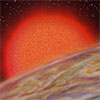 Astronomers have found three Jupiter-like exoplanets that are dangerously close to being 'swallowed up' by their host stars. The discovery gives new insight into how planetary systems evolve over time, helping to reveal the fate of solar systems like our own.
Astronomers have found three Jupiter-like exoplanets that are dangerously close to being 'swallowed up' by their host stars. The discovery gives new insight into how planetary systems evolve over time, helping to reveal the fate of solar systems like our own.
Jan 13th, 2022
Read more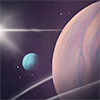 International researchers have found a new candidate for an exomoon - a moon that orbits planets beyond the realm of our Solar System. If its exomoon status is confirmed, Kepler-1708 b-i - which is 2.6 times larger than Earth - could represent a missing piece in the puzzle to understand the formation and evolution of planetary systems long ago in galaxies far, far away.
International researchers have found a new candidate for an exomoon - a moon that orbits planets beyond the realm of our Solar System. If its exomoon status is confirmed, Kepler-1708 b-i - which is 2.6 times larger than Earth - could represent a missing piece in the puzzle to understand the formation and evolution of planetary systems long ago in galaxies far, far away.
Jan 13th, 2022
Read more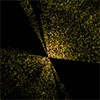 DESI has already mapped out more galaxies than all previous 3D surveys combined - and it's just getting started.
DESI has already mapped out more galaxies than all previous 3D surveys combined - and it's just getting started.
Jan 13th, 2022
Read more